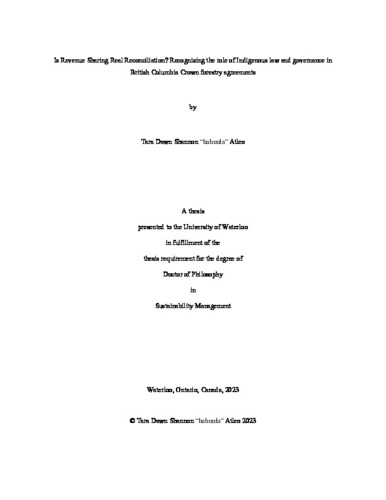| dc.contributor.author | Atleo, Tara | |
| dc.date.accessioned | 2023-07-27 15:43:23 (GMT) | |
| dc.date.available | 2023-07-27 15:43:23 (GMT) | |
| dc.date.issued | 2023-07-27 | |
| dc.date.submitted | 2023-06-28 | |
| dc.identifier.uri | http://hdl.handle.net/10012/19637 | |
| dc.description.abstract | From the banning of cultural protocols to the installation of assimilation and genocidal tactics, Indigenous law and governance within communities throughout British Columbia have experienced tremendous hardship and transformation since first contact. Colonial systems have stifled Indigenous cultural governance structures, compromising Indigenous communities’ centuries-old methods of sustainable land and resource management through stewardship. In efforts and with intent to right the wrongdoings of the past, Canadian Crown government bodies have made commitments towards reconciliation with Indigenous peoples throughout the country. There is no single definition for what reconciliation means to Indigenous communities within British Columbia, though it must encompass recognition, respect, reinvigoration and integration of Indigenous law and governance systems and practices in all aspects of society as a path forward.
Vital to Indigenous law and governance systems within Indigenous communities, both past and present, are unique and complex economic systems. Literature has evolved to understand that Indigenous stewardship is key to sustainable development and targeted climate action through recognition of Indigenous communities living within their territories sustainably for millennia. Despite the acknowledged importance of Indigenous stewardship in natural resource management initiatives, land-based decision making within British Columbia continues to design and implement processes and mechanisms that stifle Indigenous law and governance and misrepresent Indigenous values.
Using document analysis of 123 forestry-centric government to government Forest Consultation and Revenue Sharing Agreements within British Columbia, this thesis uses an Indigenous perspective to analyze the recognition of Indigenous law and governance systems and the opportunities to uphold these systems with non-market valuation within natural resource management in Indigenous territories. Nine of the analyzed agreements exhibited inclusion of Indigenous law and governance systems in their terms, while none of the agreements provided evidence of non-market valuation despite providing compensation measures for natural resource extraction on the land base.
By empowering the voices and oral teachings of Indigenous communities within natural resource management through modified economic valuation methods inclusive of Indigenous law and governance, this thesis discusses opportunities for implementing real reconciliation efforts by demonstrating the means and critical importance of a holistic valuation approach. | en |
| dc.language.iso | en | en |
| dc.publisher | University of Waterloo | en |
| dc.title | Is Revenue Sharing Real Reconciliation? Recognizing the role of Indigenous law and governance in British Columbia Crown forestry agreements | en |
| dc.type | Doctoral Thesis | en |
| dc.pending | false | |
| uws-etd.degree.department | School of Environment, Enterprise and Development | en |
| uws-etd.degree.discipline | Sustainability Management | en |
| uws-etd.degree.grantor | University of Waterloo | en |
| uws-etd.degree | Doctor of Philosophy | en |
| uws-etd.embargo.terms | 0 | en |
| uws.contributor.advisor | Cordonier Segger, Marie-Claire | |
| uws.contributor.advisor | Singh, Simron | |
| uws.contributor.affiliation1 | Faculty of Environment | en |
| uws.published.city | Waterloo | en |
| uws.published.country | Canada | en |
| uws.published.province | Ontario | en |
| uws.typeOfResource | Text | en |
| uws.peerReviewStatus | Unreviewed | en |
| uws.scholarLevel | Graduate | en |

